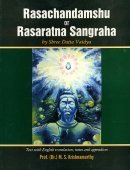Rasanjana, Rasāñjana, Rasa-anjana, Rasañjana, Rasamjana: 17 definitions
Introduction:
Rasanjana means something in Hinduism, Sanskrit, Buddhism, Pali, Marathi, biology. If you want to know the exact meaning, history, etymology or English translation of this term then check out the descriptions on this page. Add your comment or reference to a book if you want to contribute to this summary article.
In Hinduism
Ayurveda (science of life)
Rasashastra (Alchemy and Herbo-Mineral preparations)
Source: Wisdom Library: Rasa-śāstraRasāñjana (रसाञ्जन):—One of the five variations of Añjana (‘collyrium, galena’), which is part of the uparasa group of eight minerals, according to the Rasaprakāśasudhākara: a 13th century Sanskrit book on Indian alchemy, or, Rasaśāstra. It has a yellowish color.
Source: Indian Journal of History of Science: Rasaprakāśa-sudhākara, chapter 6Rasāñjana is a variety of Añjana (“Collyrium”).—The Rasāñjana prepared from Dārvi (dāruharidrā) Kvatha is considered best. It is yellowish in colour, pacifys viṣa-doṣa and raktadoṣa, destroys hiccough associated with śvasa (asthma/breathing trouble), improves complexion, destroys vātaprakopa and kṛmiroga (worms manifestation).
Cikitsa (natural therapy and treatment for medical conditions)
Source: Ancient Science of Life: Botanical identification of plants described in Mādhava CikitsāRasāñjana (रसाञ्जन) or Dārvī refers to the extract of medicinal plant Berberis aristata DC., and is used in the treatment of atisāra (diarrhoea), according to the 7th century Mādhavacikitsā chapter 2. Atisāra refers to a condition where there are three or more loose or liquid stools (bowel movements) per day or more stool than normal. The second chapter of the Mādhavacikitsā explains several preparations [including Rasāñjana] through 60 Sanskrit verses about treating this problem.
Unclassified Ayurveda definitions
Source: archive.org: Vagbhata’s Ashtanga Hridaya Samhita (first 5 chapters)Rasāñjana (रसाञ्जन) refers to “elixir-salve”, and is mentioned in verse 2.5 of the Aṣṭāṅgahṛdayasaṃhitā (Sūtrasthāna) by Vāgbhaṭa.—Accordingly, “the eye (is) composed of fire, (and) the danger of phlegm (is) particularly (imminent) for it; so one shall apply elixir-salve (rasāñjana) every seven nights for demueification”.
Note: Rasāñjana (“elixir-salve”) is understood as a rule to denote an extract called rasaut in the vernaculars and prepared by boiling together equal parts of a decoction of Indian barberry (Berberis asiatica Roxb. and other species) and milk. Dutt (Materia p. 107) points out that some Bengali physicians, who are evidently not acquainted with this plant, invariably use galena or lead sulphide whenever the term occurs in a prescription. Other substitutes are copper vitriol and brass calx (pw V 174).

Āyurveda (आयुर्वेद, ayurveda) is a branch of Indian science dealing with medicine, herbalism, taxology, anatomy, surgery, alchemy and related topics. Traditional practice of Āyurveda in ancient India dates back to at least the first millenium BC. Literature is commonly written in Sanskrit using various poetic metres.
General definition (in Hinduism)
Source: Alois Payer - Amarakośa: Vaiśyavarga 100-106bRasāñjana (रसाञ्जन) is the extract of the wood of Berberis Asiatica called rasot in the vernacular. It will be noticed in its place in the Vegetable Materia Medica.
Biology (plants and animals)
Source: Google Books: CRC World Dictionary (Regional names)1) Rasanjana in India is the name of a plant defined with Berberis aristata in various botanical sources. This page contains potential references in Ayurveda, modern medicine, and other folk traditions or local practices It has the synonym Berberis aristata Sims.
2) Rasanjana is also identified with Berberis asiatica It has the synonym Berberis asiatica Roxb. ex DC. (etc.).
Example references for further research on medicinal uses or toxicity (see latin names for full list):
· Phytotherapy Research (1995)
· Botanical Magazine, or ‘Flower-Garden Displayed’ (2549)
· Journal of Cytology and Genetics (1988)
· Bot. Reg. (1823)
· Journal of Cytology and Genetics (1984)
· Taxon (1975)
If you are looking for specific details regarding Rasanjana, for example side effects, diet and recipes, extract dosage, health benefits, pregnancy safety, chemical composition, have a look at these references.

This sections includes definitions from the five kingdoms of living things: Animals, Plants, Fungi, Protists and Monera. It will include both the official binomial nomenclature (scientific names usually in Latin) as well as regional spellings and variants.
Languages of India and abroad
Pali-English dictionary
Source: BuddhaSasana: Concise Pali-English Dictionaryrasañjana : (nt.) a sort of collyrium.
Source: Sutta: The Pali Text Society's Pali-English DictionaryRasañjana refers to: a sort of ointment (among 5 kinds), “vitriol” (Rh. D.) Vin. I, 203.
Note: rasañjana is a Pali compound consisting of the words rasa and añjana.

Pali is the language of the Tipiṭaka, which is the sacred canon of Theravāda Buddhism and contains much of the Buddha’s speech. Closeley related to Sanskrit, both languages are used interchangeably between religions.
Marathi-English dictionary
Source: DDSA: The Molesworth Marathi and English Dictionaryrasāñjana (रसांजन).—n (S) A collyrium. It is prepared by boiling together calx of brass and one eighth of dārūhaḷada or curcuma zanthorrizon, by adding to the decoction an equal quantity of goat's milk, and by evaporating the compound to one fourth. Ex. nētrīṃ rasāñjanācēṃ añjana.
Marathi is an Indo-European language having over 70 million native speakers people in (predominantly) Maharashtra India. Marathi, like many other Indo-Aryan languages, evolved from early forms of Prakrit, which itself is a subset of Sanskrit, one of the most ancient languages of the world.
Sanskrit dictionary
Source: DDSA: The practical Sanskrit-English dictionaryRasāñjana (रसाञ्जन).—vitriol of copper, a sort of collyrium.
Derivable forms: rasāñjanam (रसाञ्जनम्).
Rasāñjana is a Sanskrit compound consisting of the terms rasa and añjana (अञ्जन).
Source: Cologne Digital Sanskrit Dictionaries: Shabda-Sagara Sanskrit-English DictionaryRasāñjana (रसाञ्जन).—n.
(-naṃ) A sort of collyrium, prepared either with the calx of brass, or with the Amomum anthorrhiza. E. rasa juice, &c., añjana collyrium.
Source: Cologne Digital Sanskrit Dictionaries: Benfey Sanskrit-English DictionaryRasāñjana (रसाञ्जन).—n. a particular sort of collyrium, [Śiśupālavadha] 9, 21.
Rasāñjana is a Sanskrit compound consisting of the terms rasa and añjana (अञ्जन).
Source: Cologne Digital Sanskrit Dictionaries: Monier-Williams Sanskrit-English DictionaryRasāñjana (रसाञ्जन):—[from rasa > ras] n. vitriol of copper or a sort of collyrium prepared from it with the addition of Curcuma or ([according to] to some) from the calx of brass with Amomum Anthorrhiza or ([according to] to others) from lead-ore, [Suśruta]
Source: Cologne Digital Sanskrit Dictionaries: Yates Sanskrit-English DictionaryRasāñjana (रसाञ्जन):—[rasā+ñjana] (naṃ) 1. n. A collyrium.
[Sanskrit to German]
Sanskrit, also spelled संस्कृतम् (saṃskṛtam), is an ancient language of India commonly seen as the grandmother of the Indo-European language family (even English!). Closely allied with Prakrit and Pali, Sanskrit is more exhaustive in both grammar and terms and has the most extensive collection of literature in the world, greatly surpassing its sister-languages Greek and Latin.
Kannada-English dictionary
Source: Alar: Kannada-English corpusRasāṃjana (ರಸಾಂಜನ):—[noun] copper sulphate.
Kannada is a Dravidian language (as opposed to the Indo-European language family) mainly spoken in the southwestern region of India.
See also (Relevant definitions)
Partial matches: Anjana, Rasa, Ancana.
Starts with: Racancanam.
Ends with: Prasanjana.
Full-text (+5): Anjana, Rasaraja, Tarkshyashaila, Balabhaishajya, Agnisara, Tryanjana, Priyangvadi, Rasagraja, Darvikvathodbhava, Rasanjan, Racancanam, Rasagarbha, Anjanatritaya, Rasaloha, Anjanadi, Darvi, Prananta, Shaila, Upadhatu, Darvyadikvatha.
Relevant text
Search found 17 books and stories containing Rasanjana, Rasa-anjana, Rasa-añjana, Rasamjana, Rasāṃjana, Rasāñjana, Rasañjana, Rasānjana; (plurals include: Rasanjanas, anjanas, añjanas, Rasamjanas, Rasāṃjanas, Rasāñjanas, Rasañjanas, Rasānjanas). You can also click to the full overview containing English textual excerpts. Below are direct links for the most relevant articles:
Indian Medicinal Plants (by Kanhoba Ranchoddas Kirtikar)
Notes on rasanjana (aqueous extract of Berberis aristata) < [Notes]
50. Berberis lycium, Royle. < [Berberidaceae (barberry family)]
Sushruta Samhita, Volume 6: Uttara-tantra (by Kaviraj Kunja Lal Bhishagratna)
Chapter XIV - Treatment of eye-diseases which require Incision < [Canto I - Shalakya-tantra (ears, eyes, nose, mouth and throat)]
Chapter XIX - Treatment of hurt or injnry to the eye < [Canto I - Shalakya-tantra (ears, eyes, nose, mouth and throat)]
Chapter XII - Treatment of Raktaja Ophthalmia < [Canto I - Shalakya-tantra (ears, eyes, nose, mouth and throat)]
Cosmetics, Costumes and Ornaments in Ancient India (by Remadevi. O.)
2.2. Pharmaceutical use of Añjana (Collyrium) < [Chapter 1 - Cosmetics]
Charaka Samhita and Sushruta Samhita (by Nayana Sharma)
Facial Hygiene < [Chapter 6]
Rasa Jala Nidhi, vol 2: Minerals (uparasa) (by Bhudeb Mookerjee)
Part 1 - Characteristics of Anjana (stibnite, lead sulphide) < [Chapter XIV - Uparasa (15): Anjana (stibnite, sulphide of lead)]
Part 2 - Purification of anjana < [Chapter XIV - Uparasa (15): Anjana (stibnite, sulphide of lead)]
Part 4 - Uses of gairika < [Chapter IX - Uparasa (10): Gairika (red ochre)]
Bhesajjakkhandhaka (Chapter on Medicine) (by Hin-tak Sik)
Ophthalmology (Sālākiya) < [Chapter 5 - Diseases and Treatments in the Chapter on Medicine]
Related products
(+1 more products available)





